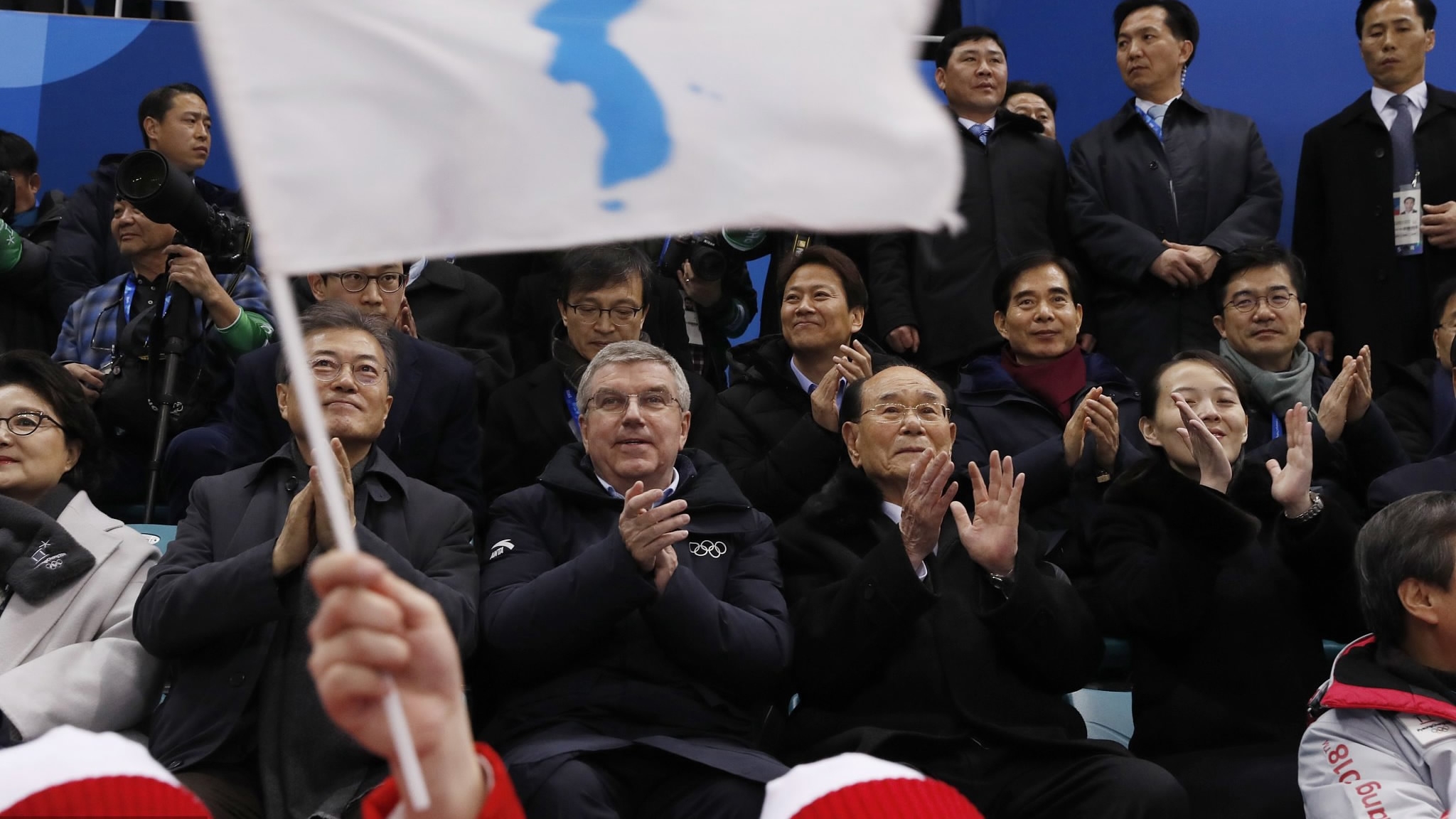A high-ranking delegation from the Democratic People's Republic of Korea (DPRK) was due to head home from the Republic of Korea (ROK) on Sunday, after a hectic three-day schedule that began with attendance at the opening ceremony of the PyeongChang Winter Olympics.
The visit came after a tense standoff over Pyongyang's nuclear program and missile tests and reflected signs of warming ties between the two neighbors.
Last month, the DPRK decided to send a delegation to the Games, including its top leader Kim Jong Un's younger sister Kim Yo Jong and the country's nominal head of state Kim Yong Nam, an art troupe, and nearly 300 cheerleaders.
While the West is suspicious of Pyongyang's approach, Seoul welcomed the decision and agreed to form a joint Olympics team.
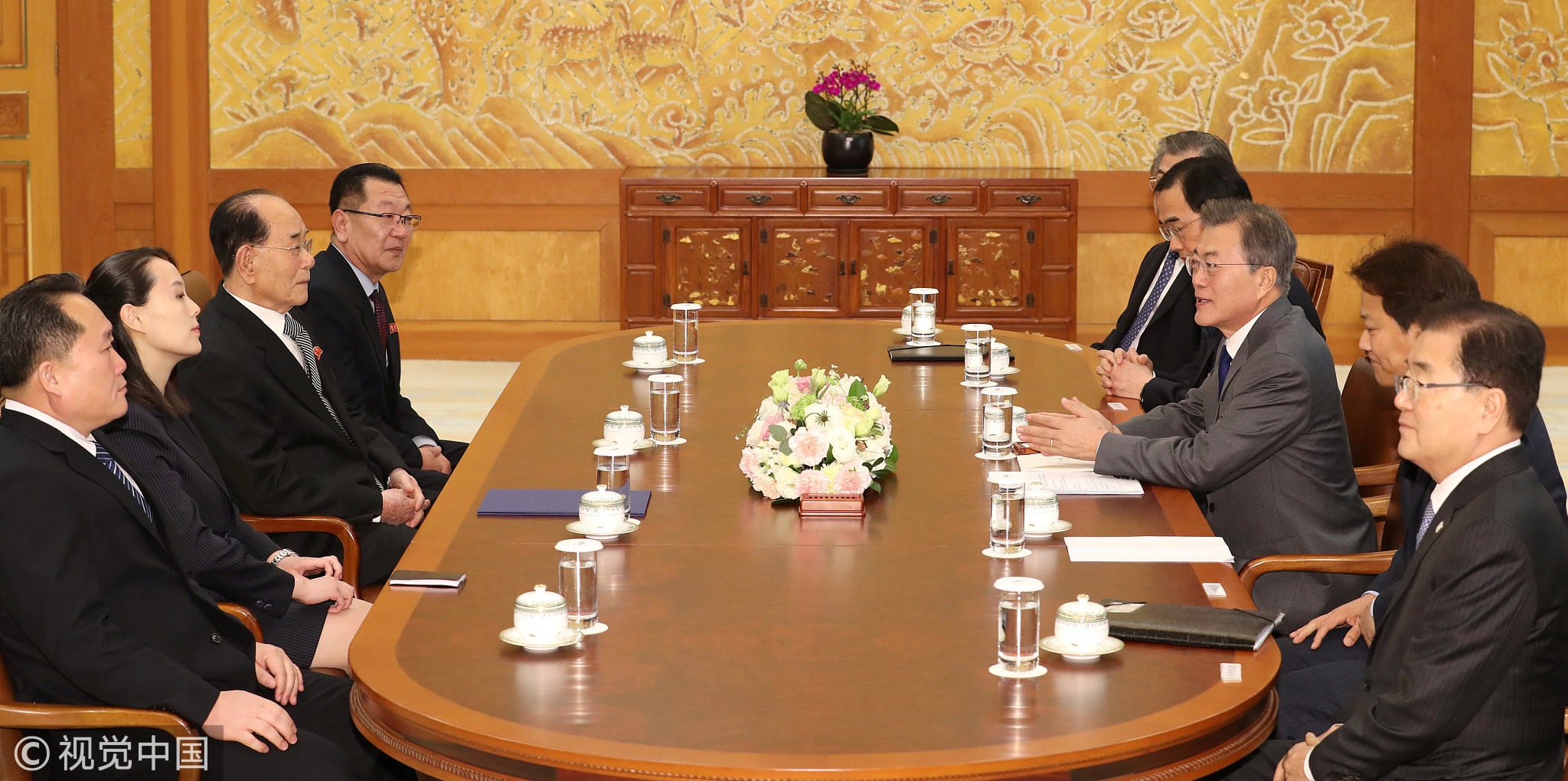
Moon Jae-in meets Kim Young Nam and Kim Yo Jong at the presidential Blue House in Seoul, Feb. 10, 2018. /VCG Photo
Moon Jae-in meets Kim Young Nam and Kim Yo Jong at the presidential Blue House in Seoul, Feb. 10, 2018. /VCG Photo
At Friday's grand opening ceremony, athletes from the two nations wore the same white jackets and marched together under a united Korea flag.
Speaking at the ceremony, ROK President Moon Jae-in called the Games a "festival and celebration of peace."
Peace symbols dripping
On Saturday, Moon held talks with the DPRK delegation. During talks and lunch at the presidential Blue House in Seoul, Kim Yo Jong delivered verbally the personal invitation from his brother – Kim Jong Un wants to meet Moon "in the near future" and would like for Moon to visit Pyongyang "at his earliest convenience."
The Blue House said Moon "practically accepted" the invitation as the DPRK expressed the "desire to improve inter-Korean relations."
It would be the first meeting of Korean leaders in more than 10 years.
The signals of peace are also dripping alongside the Olympic Games.
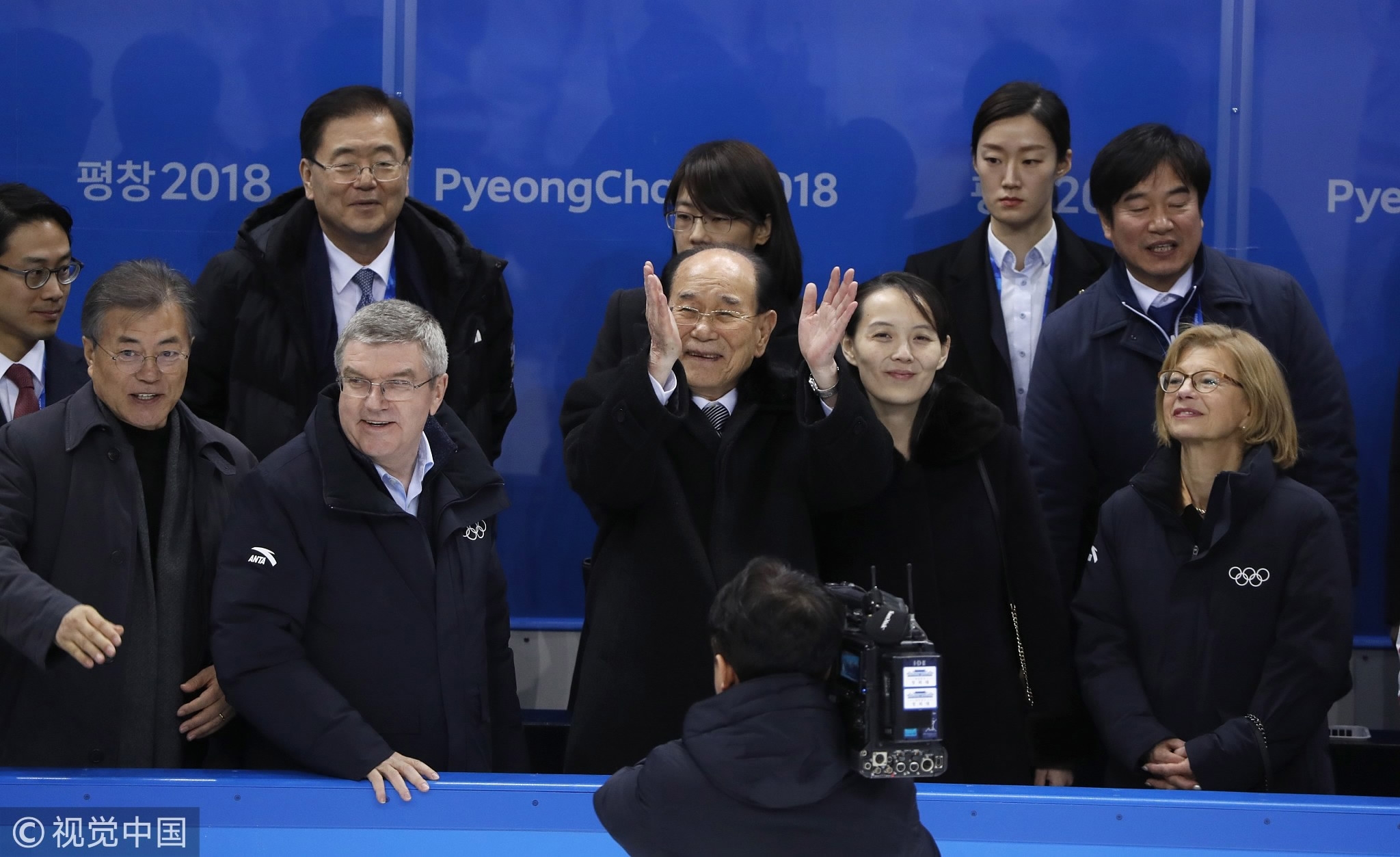
Kim Yong Nam claps as he is flanked by ROK President Moon Jae-in, IOC President Thomas Bach and Kim Yo Jong after the women's preliminary round match between Switzerland and Korea on Saturday. /VCG Photo
Kim Yong Nam claps as he is flanked by ROK President Moon Jae-in, IOC President Thomas Bach and Kim Yo Jong after the women's preliminary round match between Switzerland and Korea on Saturday. /VCG Photo
Moon and Kim watched the first play by a unified Korean hockey team on Saturday. In addition, the game was attended by Kim Yong Nam and International Olympic Committee (IOC) President Thomas Bach.
While the Korea team lost the game to Switzerland, Moon and Kim looked upbeat. After the game, they came down to the Korean team bench to speak with the players and posed for a team photo.
The cheerful moment followed a historic encounter between Moon and Kim Yo Jong.
The ROK president shook hands with the DPRK's delegation leaders before the Olympics opened.
Rift between Seoul and Washington, Tokyo
The US and Japan, however, have been wary about Pyongyang, saying it is attempting to loosen international sanctions.
The US and the DPRK have been involved in a standoff over Pyongyang's nuclear programs, and the leaders of both countries have engaged in a series of personal insults.
Before the Olympics, the White House said US Vice President Mike Pence would attend the opening ceremony to counter any effort by the DPRK to "hijack" the games with a propaganda campaign.
Pence avoided a reception dinner attended by Kim before the opening ceremony and there was no interaction or talks between Pence and the DPRK delegation in the VIP area during the opening ceremony.
On his flight back to Washington, Pence said there is still no "daylight" between the United States and its allies – S. Korea and Japan – on the need to continue to isolate the DPRK until it abandons its nuclear and ballistic missile programs.
An official accompanying Pence also said Seoul and Tokyo are "solidly with our alliance and the need to continue and intensify economic sanctions."
Tokyo echoed Washington by calling for the resumption of drills between the US and S. Korea.
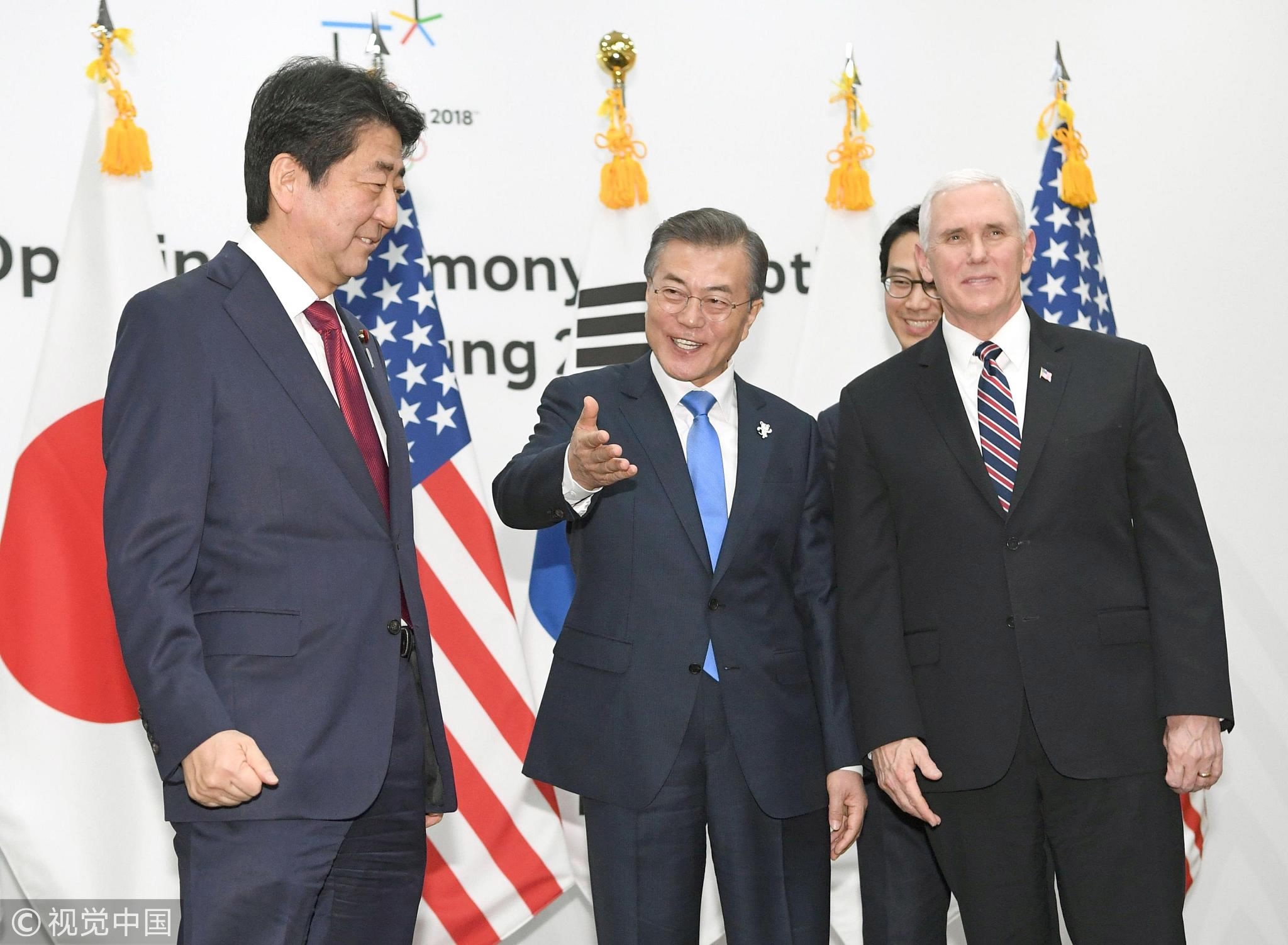
Japanese Prime Minister Shinzo Abe, South Korean President Moon Jae-in and US Vice President Mike Pence prepare for a commemorative photo in PyeongChang, ahead of the opening ceremony of the Winter Olympics on Friday. /VCG Photo
Japanese Prime Minister Shinzo Abe, South Korean President Moon Jae-in and US Vice President Mike Pence prepare for a commemorative photo in PyeongChang, ahead of the opening ceremony of the Winter Olympics on Friday. /VCG Photo
Japanese Prime Minister Shinzo Abe said Japan wants to see an "actual" change of behavior of the DPRK and said it is not the right time for Seoul to delay joint military exercises with the US.
Moon rejected the call during a bilateral meeting with Abe on Friday, saying it is his country's domestic affairs and Abe's call is a violation of sovereignty.
China supports warm ties
China has welcomed the warming ties between the two Koreas. The country's special envoy Han Zheng told President Moon that China supports the conciliation and cooperation between the two sides.
The situation in the region is undergoing positive changes and creating opportunity to build deeper talks between the two, Han said.
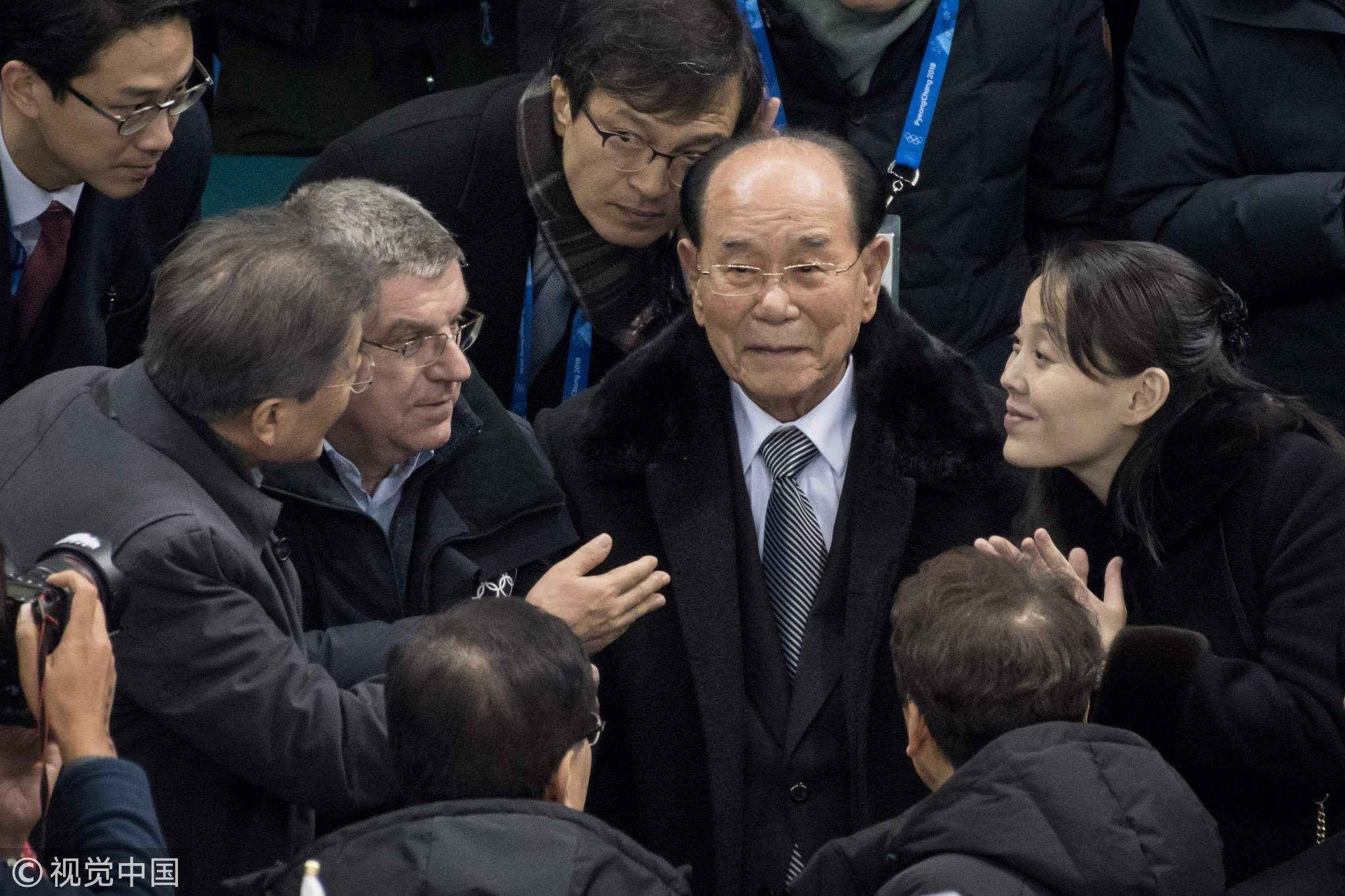
ROK President Moon Jae-in, IOC President Thomas Bach speak to the DPRK's delegates Kim Yong Nam and Kim Yo Jong as they prepare to leave following the women's preliminary round ice hockey match between the unified Korea team and Switzerland, Feb. 10, 2018. /VCG Photo
ROK President Moon Jae-in, IOC President Thomas Bach speak to the DPRK's delegates Kim Yong Nam and Kim Yo Jong as they prepare to leave following the women's preliminary round ice hockey match between the unified Korea team and Switzerland, Feb. 10, 2018. /VCG Photo
China has backed successive rounds of UN sanctions on the DPRK but it reiterated that dialogue was necessary to deescalate the tension at the Winter Olympics.
The 'low-key'
Moscow has played a low-key role, having been banned by the IOC from the Games and the forthcoming Paralympics over "systematic manipulation" of the anti-doping testing system at the 2014 Sochi Games.
But the 169 athletes who passed drug tests were allowed to participate as neutral "Olympic Athletes from Russia." On Friday, 80 Russians marched at the opening ceremony.
Russia has been calling on the US to avoid escalating the situation on the Korean Peninsula.
Last month, Russian Foreign Minister Sergey Lavrov said Russia is working closely with China on the Korean issue, and supports the "double suspension" approach proposed by China.
(With inputs from agencies)

